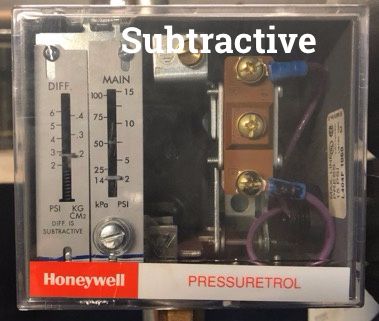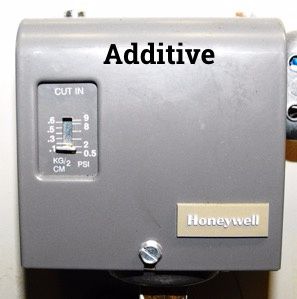This all-technical, three-hour seminar will make you familiar with the many types of old steam heating systems and what goes wrong with them. Dan Holohan’s easy-to-follow...
How to Set and Adjust the Boiler Pressure Control?
A question often asked is how to adjust the steam boiler pressure controls properly.
While it seems like a straight forward thing, it is sometimes confusing because there are two different types of pressure controls for a boiler; Subtractive and Additive.

The Subtractive version is the most common type of pressure control. For this control, you set the pressure control for the desired pressure where you want to stop the boiler. In a brewery, that is around 10-11 psig. The Differential setting is the pressure where the burner will start again. The differential pressure is usually set for about two psig or the lowest pressure you need for your process. The wider the differential, the better the efficiency. If the differential is too wide, the pressure may drop down below the temperature you require for your process. I usually set it for two psig. A sequence of how these controls work is as follows:
You start the boiler and allow the pressure to build. Once the pressure reaches your set point, 10 Psig, the burner shuts off. The burner stays off until the pressure inside the boiler drops to the differential (2 psi) setting minus the setpoint. In theory, our boiler will cycle between 8 and 10 psig. The following controls fall under the subtractive type of pressure control:
Honeywell L404 Series
Danfoss KP Series
Johnson Control (Penn) P47 Series has two settings which make it a bit easier to understand. They have two parallel vertical scales and adjustment screws. One scale is the Cut In setting, and the other is the Cut Out setting.

The Additive type control is a bit different to set and adjust. The number you see on the front is the Cut In or starting pressure of the boiler. Inside the cover is the Differential setting. If we want to operate our boiler between 8 and 10 psig, we will set the Cut In for 8 psig and the Differential for two psig. An example of an additive control is the Honeywell PA404 Series of controls.
If your boiler has a multiple position burner, that adds an additional wrinkle to setting the pressure controls. These multi-input burners have an additional pressure control called the Firing Rate control. If the boiler has this type of burner, I will set the firing rate control for the desired pressure, ten psig. I will increase the operating control to about 1-2 pounds above that setting. Once the boiler reaches the setpoint of the firing rate control, the burner will reduce the firing rate to keep the boiler operating longer. This allows a more consistent pressure and temperature for your process.
The last control you will have on your boiler is the Limit Control. This control is there as the last resort protection in case of a runaway boiler. This control should have a Manual Reset button on the front. For breweries and distilleries, I like to set this for about 14 psig. I do not want to run it up to the top of the scale as I am a bit skeptical of the accuracy at the far ends of the range. Plus, the boiler relief valve is set for 15 psig. I am a bit leery of going to close to that setting and causing it to open and lose all our steam.
Would you like to learn more from Ray Wohlfarth? Check out his seminars, books, and blog about brewing with steam.
Leave a comment
Related Posts
We always have turkey for Thanksgiving. I mean who doesn’t? My job wasn’t to cook it, though; it was to eat it.
I had written a story for Plumbing & Mechanical a while back about a fella in Canada who sent me this email: "Our problem is that five out of hundreds of univentilator co...